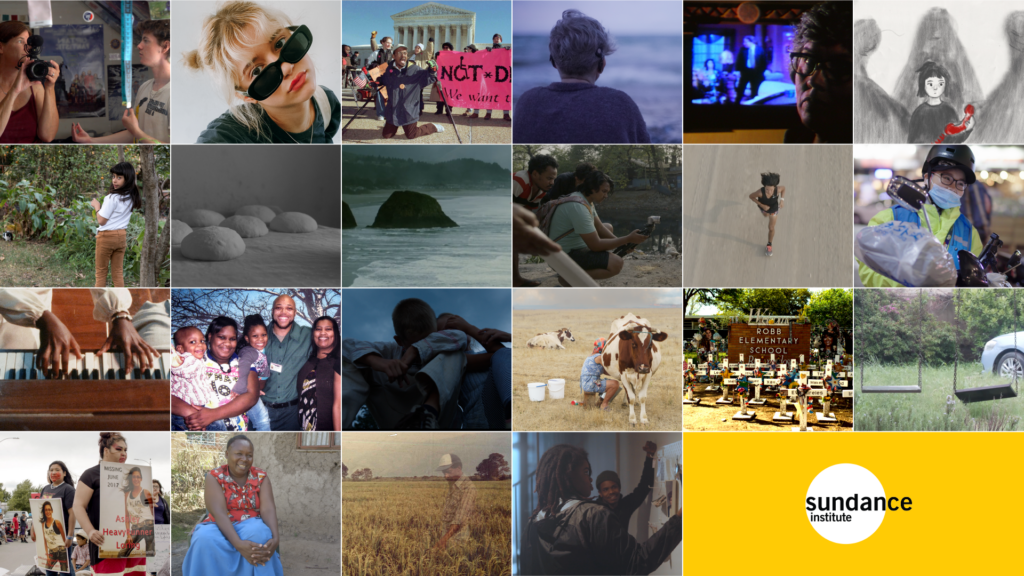23 projects to receive grants totaling over $1,000,000
Los Angeles, CA – The nonprofit Sundance Institute today announced this year’s grantees for the Sundance Institute Documentary Fund, which supports the work of nonfiction filmmakers from around the globe. Twenty-three projects have been selected for unrestricted grant funding totaling just over $1,000,000. This granting cycle’s recipients are in various stages: 6 in development, 14 in production, and 3 in post-production. In a changing media landscape, the Documentary Fund has been a stable, progressive force in supporting work that has expressed the world in creative, complex, and provocative ways and has created real cultural and social impact around some of the most pressing issues of our time. Grants are made possible by the Open Society Foundations, the John D. and Catherine T. MacArthur Foundation, Gucci, and the Kendeda Fund.
The Fund prioritizes supporting and empowering historically marginalized voices and providing a platform for integral stories to be amplified. It is committed to elevating global voices and celebrating the rich diversity of filmmaking traditions around the world. Many of the international projects supported with this round of funding reflect a priority of supporting artists living and working in regions that lack a robust infrastructure of support for independent film, regions of conflict, and countries where freedom of expression is under threat.
Many projects in this year’s slate take on subject matter that showcases humanity in the face of oppression, global views on conflict and war from the past and the present, community archive building, and protagonists who are empowered to tell their stories exploring themes of human rights, social justice and coming of age.
This cycle of granting has projects from notable filmmakers, including Looking at Ourselves directed by Oscar and Emmy nominated filmmaker Lourdes Portillo, Adam’s Apple directed by artist and filmmaker Amy Jenkins, and Untitled Uvalde Documentary by Anayansi Prado as well as projects from documentarians each making a second feature on the heels of an exciting debut such as Life After directed by Reid Davenport (I Didn’t See You There, 2022), Powwow People directed by filmmaker Sky Hopinka (maɬni – towards the ocean, towards the shore, 2020) and Girl-Tubers from director Tali Yankelevich (My Darling Supermarket, 2019).
“The stories and themes explored by this incredibly talented group of artists beautifully embody Sundance’s spirit and the mission of our program today. From reclaiming Native historical truths and exploring Black American family legacies, to trans rights, disability rights, and environmental justice, these projects carry tremendous potential for narrative change and remind us of the vital importance of bold, risk-taking independent film for a healthy democracy and a thriving civil society,” said Paola Mottura, Documentary Film Fund Director.
Previously supported projects have included: Always in Season; All That Breathes; American Factory, Collective; Crip Camp: A Disability Revolution; The Edge of Democracy; Of Fathers and Sons; Fire of Love; Hale County This Morning, This Evening; Hooligan Sparrow; I Didn’t See You There; Mija; Minding the Gap; The Mole Agent; One Child Nation; Strong Island; The Territory; and Time.
The Sundance Institute Documentary Film Program is made possible by founding support from the Open Society Foundations. Generous additional support is provided by John Templeton Foundation; National Endowment for the Humanities; John D. and Catherine T. MacArthur Foundation; Luminate; Sandbox Films; The Kendeda Fund; The Asian American Foundation (TAAF); Gucci; CNN Films; Helen Gurley Brown Foundation; The Charles Engelhard Foundation; Genuine Article Pictures; Violet Spitzer-Lucas and the Spitzer Family Foundation; National Endowment for the Arts; Nion McEvoy & Leslie Berriman; Code Blue Foundation; EarthSense Foundation; Adobe; and two anonymous donors.
DEVELOPMENT
The Beauty of the Donkey (Switzerland, France, Kosovo)
Director: Dea Gjinovci
Producers: Dea Gjinovci, Emma Lepers, Ilir Hasanaj
25 years after a brutal war, a filmmaker and her father return to Makermal, Kosovo, following her father’s 50 year exile, to create a film combining his childhood memories with a quest for truth. Confronted with painful facts, they attempt to heal and regain hope with the villagers, blurring the boundaries between reality and fantasy.
The Days I Would Like to Forget (Ukraine, France, Austria)
Directors: Alina Gorlova, Yelizaveta Smith, Simon Mozgovyi, Maksym Nakonechyi
Producers: Eugene Rachkovsky, Ralph Wieser, Nabil Bellahsene
This triptych of feature films—Human and War, Death and Life, and Space and Time—observes how the Russian-Ukrainian war changes humans and space, and affects the world. Different personal experiences combine into a holistic collective one, showing war’s influence and presence on all levels of existence.
Girl-Tubers (Brazil)
Director: Tali Yankelevich
Producer: Leonardo Mecchi
Four Brazilian girls grow up as YouTubers with millions of followers watching them day by day. They test the limits of their own performance while seeking affection from an audience of strangers. In this coming-of-age story, reality and fantasy fuse as human processes happen through virtual life. Supported by the Sundance Institute | Gucci Fund
Looking at Ourselves (U.S.A.)
Director and Producer: Lourdes Portillo
In this journey through memory and time, filmmaker Lourdes Portillo and performance artist Guillermo Gómez-Peña reflect on immigration as both a personal and universal experience.
My Mothers’ Tale (U.K.)
Director: Mizgin Arslan
Producers: Shirine Best, Avesta Kadir
Based on a black and white photograph of a time just before her family fell apart, Director Mizgin Arslan returns to her childhood memories to question her mother’s choices, and to discover if her grandmother’s story instigated the chain of events that dictated her life. A story about the conflict of motherhood across 3 generations, from the war-torn borders of Turkey and Syria, to London.
Somebody’s Gone (U.S.A.)
Directors: Cyrus Moussavi, Hubert Taylor
Producer: Brittany Nugent
Brother Theotis Taylor harvested turpentine, preached, and sang spirituals in a sublime falsetto that made him the pride of South Georgia. Driven by a divine vision, his son, Hubert, filmed it all. Forty years later, Somebody’s Gone completes the story of a great artist through the archive of his prodigal son.
PRODUCTION
The 3,000 Project (U.S.A.)
Director and Producer: Keith McQuirter
The 3,000 Project follows four stories that reveal the complexities of crime and punishment, rehabilitation, and parole in America today, while tracing the evolution of those realities over the past half century.
…that’s why He made momma (U.S.A.)
Directors: Lendl Tellington, Salome Sykes
As they realize they could lose their matriarch’s home, a brother and sister turn the camera on their great-grandmother and her nine descendants in order to reimagine their family’s legacy. As the siblings sift through memories and history, they chronicle the ingenuity of generational single black motherhood and grapple with its inheritance.
Adam’s Apple (U.S.A.)
Director: Amy Jenkins
Producers: Brit Fryer, Amy Jenkins
Spanning almost two decades, Adam’s Apple is a personal documentary about a family in transition, intimately filmed from the perspectives of artist Amy Jenkins and her transgender son, Adam. Each equipped with a camera, the film creatively chronicles an ever-shifting dynamic as Adam charts his own path toward manhood. Supported by the Sundance Institute | Gucci Fund
Life After (U.S.A.)
Director: Reid Davenport
Producers: Colleen Cassingham, Jess Devaney
Life After interrogates the contradictory political ideologies surrounding death and disability, while coalescing the missing voices of the disabled community in the contemporary debate around medically assisted suicide.
Listening to the World (Ukraine, Germany, Sweden)
Director: Yelizaveta Smith
Producers: Olga Beskhmelnytsina, Eugene Rachkovsky
Iva doesn’t hear the world because of her disability. Iva and her son Mykyta face the war and flee to Germany as refugees. In Berlin, Iva gets a chance to do surgery and to hear the world again. Supported by the Sundance Institute | Gucci Fund
Niñxs (Mexico)
Director: Kani Lapuerta Laorden
Producer: Suleica Adriana Pineda Rodríguez
In the magical town of Tepoztlán, Mexico, Karla is making a movie about her story with Kani, while she faces a binary society that tries to fit her into one gender or another. Between games and prejudices, this transgender girl is on her journey to adolescence, taking off a timid but certain flight towards the construction of her own identity.
Our Seeds (Turkey, Germany)
Director: Erhan Arık
Producers: Meryem Yavuz, Manuel Rees, Frank Carsten Walter
In northeastern Turkey, a farming couple — who are still keeping a 1,500-year-old ancestral seed alive — face the fact that they cannot leave the fate of the seed in the hands of their children. Supported by the Sundance Institute | Kendeda Fund
Powwow People (U.S.A.)
Director: Sky Hopinka (Ho-Chunk/Pechanga)
Producers: John Cardellino, Adam Piron (Kiowa/Mohawk)
Powwow People is a cinematic invitation into the world of Native American powwow culture. Told through Hopinka’s distinct artistic style and lens of lived experience, the film poetically depicts a powwow organized and hosted through the production of this film.
Redlight to Limelight (India)
Director: Bipuljit Basu
Producer: Nilotpal Majumdar
With a dream of telling their own stories, sex workers and their children form an amateur film unit in a Kolkata brothel. Amid the joy of storytelling, the resilient crew scales the battle up to resist prostitution among young girls and make the brothel a better place to live.
Remaining Native (U.S.A.)
Director: Paige Bethmann (Haudenosaunee)
Producers: Paige Bethmann, Jessica Epstein, Judd Erhlich
Ku Stevens dreams of becoming an elite runner but when the remains of Native children are discovered, Ku reckons with his family’s past while trying to run towards his future.
Untitled Yemen Project (Yemen, Netherlands, U.S.A.)
Directors and Producers: Sara Ishaq, Sonia Kennebeck
An unlikely Yemeni couple who come from polar-opposite backgrounds push back against social pressures and call for peace as they face their uncertain futures in a devastating war.
When They Were Here (U.S.A.)
Directors: Ivan MacDonald (Blackfeet), Ivy MacDonald (Blackfeet)
Producers: Ivan MacDonald, Mridu Chandra, Jessica Jane Hart
When They Were Here is a documentary about the Missing and Murdered Indigenous Women and Girls crisis on the Blackfeet Reservation in northern Montana, told through the eyes of the families and community members left behind. The film traces experiences through time, place, and memory–and examines the legacy of violence in the place they call home.
Widow Champion (Kenya)
Director: Zippy Kimundu
Producers: Zippy Kimundu, Heather Courtney
Thrown off her land and out of her home by her in-laws, a Kenyan widow becomes a fighter for women’s rights, organizing other widows to demand what’s rightfully theirs. These women, caught between traditional beliefs and the modern world, work with village elders to create a community court to help solve longstanding conflicts.
Will They Ever Come Back? (Colombia)
Director: Ángela Carabalí
Producers: Sandra Tabares-Duque, Ángela Carabalí
Driving down a long Colombian road, Ángela and her sister enter the indigenous land where their father, an Afro-descendant farmer, was forcibly disappeared years ago. In a dream, he asks to be found. The journey confronts them with mysticism and a violated community that resists, maintaining a deep bond with the land.
POST-PRODUCTION
Ride with Delivery Workers (U.S.A.)
Director: Jing Wang
Producers: Jing Wang, Dr. Do Jun Lee, Annie Berman, Nicholas Wong
After a four-year battle, immigrant delivery workers in New York City win the right to ride the e-bikes that make their demanding jobs possible, only to find themselves on the frontlines of the pandemic fighting to survive. Filmmaker Jing Wang rides alongside this vulnerable yet essential community with her unflinching, intimate camera.
Untitled (Myanmar)
Director and Producer: Min Min Hein
Untitled Uvalde Documentary (U.S.A.)
Director: Anayansi Prado
Producers: Anayansi Prado, Mary Recine
Supported by the Sundance Institute | Kendeda Fund
Sundance Institute
As a champion and curator of independent stories, the nonprofit Sundance Institute provides and preserves the space for artists across storytelling media to create and thrive. Founded in 1981 by Robert Redford, the Institute’s signature labs, granting, and mentorship programs, dedicated to developing new work, take place throughout the year in the U.S. and internationally. Sundance Collab, a digital community platform, brings a global cohort of working artists together to learn from each other and Sundance advisors and connect in a creative space, developing and sharing works in progress. The Sundance Film Festival and other public programs connect audiences and artists to ignite new ideas, discover original voices, and build a community dedicated to independent storytelling. Through the Sundance Institute artist programs we have supported such projects as Beasts of the Southern Wild, The Big Sick, Bottle Rocket, Boys Don’t Cry, Boys State, Call Me By Your Name, Clemency, CODA, Drunktown’s Finest, The Farewell, Fire of Love, Flee, The Forty-Year-Old Version, Fruitvale Station, Get Out, Half Nelson, Hedwig and the Angry Inch, Hereditary, Honeyland, The Infiltrators, The Last Black Man in San Francisco, Little Woods, Love & Basketball, Me and You and Everyone We Know, Mudbound, Nanny, Navalny, O.J.: Made in America, One Child Nation, Pariah, Raising Victor Vargas, Requiem for a Dream, Reservoir Dogs, RBG, Sin Nombre, Sorry to Bother You, The Souvenir, Strong Island, Summer of Soul (…or, When the Revolution Could Not Be Televised), Swiss Army Man, Sydney, A Thousand and One, Top of the Lake, Walking and Talking, Won’t You Be My Neighbor?, and Zola. Through year-round artist programs, the Institute also nurtured the early careers of artists such as Paul Thomas Anderson, Wes Anderson, Gregg Araki, Darren Aronofsky, Lisa Cholodenko, Ryan Coogler, Nia DaCosta, The Daniels, David Gordon Green, Miranda July, James Mangold, John Cameron Mitchell, Kimberly Peirce, Boots Riley, Ira Sachs, Quentin Tarantino, Taika Waititi, Lulu Wang, and Chloé Zhao. Support Sundance Institute in our commitment to uplifting bold artists and powerful storytelling globally by making a donation at sundance.org/donate. Join Sundance Institute on Facebook, Instagram, Twitter and YouTube.
###







